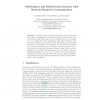Free Online Productivity Tools
i2Speak
i2Symbol
i2OCR
iTex2Img
iWeb2Print
iWeb2Shot
i2Type
iPdf2Split
iPdf2Merge
i2Bopomofo
i2Arabic
i2Style
i2Image
i2PDF
iLatex2Rtf
Sci2ools
ESA
2003
Springer
2003
Springer
Multi-player and Multi-round Auctions with Severely Bounded Communication
We study auctions in which bidders have severe constraints on the size of messages they are allowed to send to the auctioneer. In such auctions, each bidder has a set of k possible bids (i.e. he can send up to t = log(k) bits to the mechanism). This paper studies the loss of economic efficiency and revenue in such mechanisms, compared with the case of unconstrained communication. For any number of players, we present auctions that incur an efficiency loss and a revenue loss of O( 1 k2 ), and we show that this upper bound is tight. When we allow the players to send their bits sequentially, we can construct even more efficient mechanisms, but only up to a factor of 2 in the amount of communication needed. We also show that when the players’ valuations for the item are not independently distributed, we cannot do much better than a trivial mechanism.
| Added | 06 Jul 2010 |
| Updated | 06 Jul 2010 |
| Type | Conference |
| Year | 2003 |
| Where | ESA |
| Authors | Liad Blumrosen, Noam Nisan, Ilya Segal |
Comments (0)

